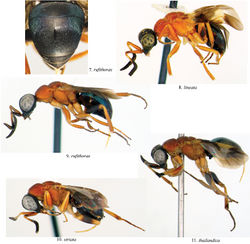Atoposega
| Notice: | This page is derived from the original publication listed below, whose author(s) should always be credited. Further contributors may edit and improve the content of this page and, consequently, need to be credited as well (see page history). Any assessment of factual correctness requires a careful review of the original article as well as of subsequent contributions.
If you are uncertain whether your planned contribution is correct or not, we suggest that you use the associated discussion page instead of editing the page directly. This page should be cited as follows (rationale):
Citation formats to copy and paste
BibTeX: @article{Kimsey2014ZooKeys409, RIS/ Endnote: TY - JOUR Wikipedia/ Citizendium: <ref name="Kimsey2014ZooKeys409">{{Citation See also the citation download page at the journal. |
Ordo: Hymenoptera
Familia: Chrysididae
Name
Atoposega Krombein – Wikispecies link – Pensoft Profile
- Atopogyne Krombein, 1957: 184. Type: Atopogyne lineata Krombein, 1957: 186. Nec Forel 1911[1]. Original designation
- Atoposega Krombein, 1960: 33. Replacement name for Atopogyne Krombein.
Diagnosis
Female Atoposega most closely resemble those of Mahinda Krombein based on the acute or spine-like propodeal angles and mesopleuron with-well developed omaulus. Female Atoposega differ from Mahinda as they are fully winged (all known Mahinda are strongly brachypterous), the hindcoxa has with two longitudinal carina (one or none in Mahinda), and the mesopleuron has a dorsally carinate and U-shaped posteromedial groove (a narrow, parallel-sided longitudinal groove in Mahinda). In addition Mahinda females have two sharp submedial angles above the posterior propodeal declivity, which do not occur in Atoposega. Perissosega females are fully winged, but unlike Atoposega and Mahinda have a transverse frontal carina, and lack an omaulus. Atoposega can be distinguished from other amisegine genera by these characters, and by the dentate tarsal claws, malar space with a vertical sulcus, frons without transverse carina, vertex without longitudinal welt, pronotum with posteromedial longitudinal pit, and short sulcus and pit adjacent to lateral posterior lobe, mesopleuron without scrobal sulcus, metanotal dorsal enclosure usually V-shaped, propodeum with two dorsomedial decumbent angles and posterior declivity smooth and impunctate, with longitudinal medial carina, and forewing with an arcuate Rs vein.
Generic description
Head: occipital carina well-developed, visible laterally; eye with tiny sparse setulae, encircled by carina; scapal basin deep, wide and coarsely cross-ridged; malar space with vertical groove; female flagellum short, fusiform and flattened on one surface. Mesosoma: pronotum with posteromedial groove and deep pit before lateral lobe, 0.8–0.9× as long as combined lengths of scutum, scutellum and metanotum; scutum with notauli deep and narrow, without parapsides; mesopleuron evenly punctate, omaulus well-developed, scrobal sulcus absent, posteromedial fossa U-shaped, carina edged; metanotum elongate, subequal in length to scutellum, with triangular medial enclosure; propodeum dorsal surface bending abruptly to posterior declivity, lateral angles long, spike-like; hindcoxa with two longitudinal, dorsobasal carinae; tarsal claw with large medial tooth; female fully winged; forewing R1 clearly indicated, medial vein arising before cu-a, Rs extended at abrupt angle by dark streak; wings densely setose, often banded. Metasoma: sternum I produced into large basal keel.
Distribution
Atoposega species have been collected in Myanmar, Borneo, Thailand and Malaysia.
Key to the species of Atoposega
Taxon Treatment
- Kimsey, L; 2014: Reevaluation of the odd chrysidid genus Atoposega Krombein (Hymenoptera, Chrysididae, Amiseginae) ZooKeys, 409: 35-47. doi
Other References
- ↑ Forel A (1911) Fourmis de Bornéo, Singapore, Ceylan, etc. récoltées par MM. Haviland, Green, Winkler, Will, Hose, Roepke et Waldo. Revue Suisse de Zoologie 19: 23-62.
Images
|
